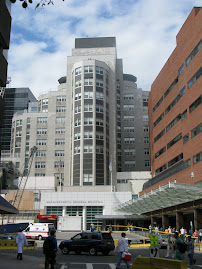The main goal of the lab is to research the HIppo Kinase Signaling Pathway. This is a complicated pathway which still has a lot of holes in it that need to be researched. The Hippo Pathway has been extensively researched in Drosophila Melanogaster (the fruit fly), and mutation sin the pathway are largely connected to tumorgenesis in Drosophila. This pathway also parallels a very similar pathway in mammals. Hippo seems to be extremely important to cancer, especially Pancreatic Adenocarcinoma. At the lab, we are in the process of beginning to compare normal and cancerous pancreatic cells. We are going to try to detect whether the components of the Hippo pathway are over or under expressed in the cancerous cells.
(Although the lab is researching the mammalian version of this pathway, for clarity, I will describe it all in terms of the Drosophila version). In Drosophila, the Hippo Pathway is essentially a pathway of kinases that regulates organ growth. When cells are growing, the pathway is "off," and the protein "Yorkie" binds to DNA and regulates the trancription of genes that are involved in cell proliferation and apoptosis (programmed cell death). When the organ reaches its "adult" size, an unknown signal activates the Hippo pathway. The kinase "Hippo" then activates the kinase "Warts" by way of phosphorylation. Warts then phosphorylates Yorkie, and thus inactivates Yorkie. This essentially causes the organ to stop growing because Yorkie is no longer able to regulate growth. HOwever, mutations in this pathway can lead to sustained activation of Yorkie and thus, uncontrolled growth and cancer. So, in the lab we are hoping to find overexpression of Yorkie (known as YAP in mammals) and underexpression of Hippo (MST1 or 2 in mammals) and Warts (LATS 1 or 2 in mammals) in the cancerous pancreatic cells. To see a more detailed description and diagrams see http://www.mshri.on.ca/mcneill/fat.html .
However, we have not gotten that far yet. My first task of the week was to test a RT-PCR (Reverse Transcription - Polymerase Chain Reaction) for contamination. It is important to test the kit for contamination so that we can be sure we are getting accurate results later on down the road. RT-PCR essentially converts RNA to cDNA, and then amplifies (or creates many copies of) the cDNA. Then, we use gel electrophoresis to see if everything went as planned. The kit tested fine, so we were able to move on!
On Wednesday, Dirk and I isolated RNA from pancreatic tissues (Thank you, organ donors!!). This process essentially involves grinding the tissue into a homogeneous liquid, and then filtering out everything but the RNA. The RNA is then mixed into a solution used in the RT-PCR.
On Thursday, we used our isolated RNA in another RT-PCR to test if we had contaminated the pancreatic RNA. After performing the gel electrophoresis, it was clear there was a decent amount of contamination. However, we did not know where this contamination came from. It was possible we had mixed something wrong, something had made it through the filter, or some other contamination occured during the RNA isolation procedure.
So, on Friday, I performed yet another RT-PCR test for contamination. In the gel electrophoresis step, we not only looked at the cDNA we had created in the RT-PCR, but also the diluted RNA, the DEPC-treated water used in the isolation, and straight RNA. It turned out that the source of contamination was the DEPC-treated water! Although this process literally took up an entire extra day of work, it saved a lot of work and confusion down the road, as well as prevented any false conclusions.
Next week, I believe we are going to begin actually comparing cancerous and non-cancerous pancreatic cells. There is also word that I may be able to go down to the mice lab and see what goes on down there, as well as go to PAthology to observe the retrieving of donated pancreases. I will also begin my clinical "rounds" in two weeks. I will be following doctors around the OR, ICU, ER, etc. once a week from then on. I can't wait!
Overall, everything is going extremely well! Life at Harvard is still great (even though the thought of taking a class during summer vacation isn't very attractive, I love it so far!). I decided not to participate in the choir, just because there isn't enough time in the day! Finally, although I was and still am a bit overwhelmed at the lab, I am learning a TON every day and am loving every minute of this new challenge.
-Mike












